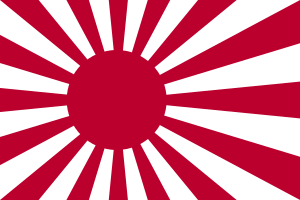Japanese Maritime Self-Defence Force
|
Japan Maritime Self-Defense Force (JMSDF) 海上自衛隊 (Kaijō Jieitai) |
|
|---|---|

|
|
| Founded | July 1, 1954 |
| Country |
|
| Type | Navy |
| Size | 50,800 personnel 154 ships 346 aircraft |
| Part of |
|
| Garrison/HQ | Yokosuka, Japan |
| Fleet | 19 Submarine 26 Destroyer 10 Small destroyer 6 Destroyer escort 4 Helicopter destroyer 3 Landing Ship, Tank 30 Minesweeper 6 Patrol vessel 8 Training ship (21 Auxiliaries) |
| Website | www |
| Commanders | |
| Commander-in-Chief | PM Shinzō Abe |
| Minister of Defense | Tomomi Inada |
| Chief of the Joint Staff | Admiral Katsutoshi Kawano |
| Chief of the Maritime Staff | Admiral Yutaka Murakawa |
The Japan Maritime Self-Defense Force (海上自衛隊 Kaijō Jieitai?), or JMSDF, is the naval branch of the Japan Self-Defense Forces, tasked with the naval defense of Japan. It was formed following the dissolution of the Imperial Japanese Navy (IJN) after World War II. The JMSDF has a fleet of 154 ships and 346 aircraft. Its main tasks are to maintain control of the nation's sea lanes and to patrol territorial waters. It also participates in UN-led peacekeeping operations (PKOs) and Maritime Interdiction Operations (MIOs).
Japan has a long history of naval interaction with the Asian continent, involving the transportation of troops, starting at least with the beginning of the Kofun period in the 3rd century. Following the attempts at Mongol invasions of Japan by Kublai Khan in 1274 and 1281, Japanese wakō became very active in plundering the coast of the Chinese Empire.
Japan undertook major naval building efforts in the 16th century, during the Warring States period, when feudal rulers vying for supremacy built vast coastal navies of several hundred ships. Around that time, Japan may have developed one of the world's first ironclad warships, when Oda Nobunaga (a Japanese daimyo) had six iron-covered Oatakebune made in 1576.
In 1588, Toyotomi Hideyoshi issued a ban on Wakō piracy; the pirates then became vassals of Hideyoshi and comprised the naval force used in the Japanese invasion of Korea.
...
Wikipedia
